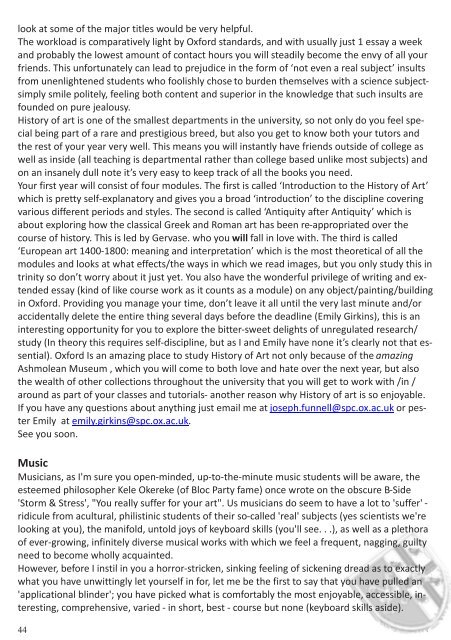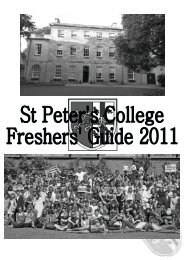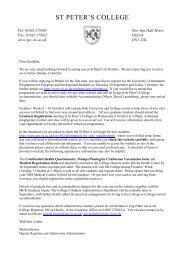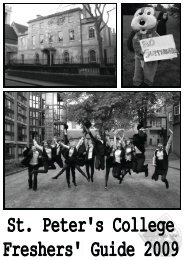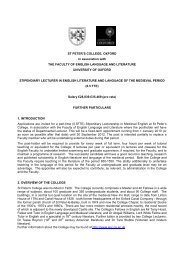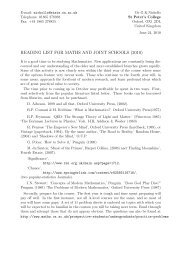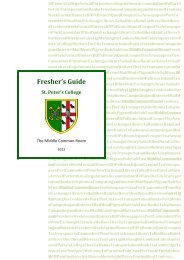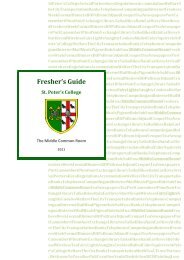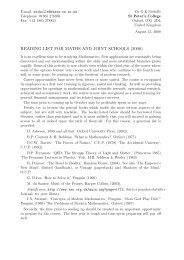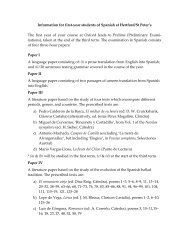, We've got squirrels in our quad! - St Peter's College
, We've got squirrels in our quad! - St Peter's College
, We've got squirrels in our quad! - St Peter's College
Create successful ePaper yourself
Turn your PDF publications into a flip-book with our unique Google optimized e-Paper software.
look at some of the major titles would be very helpful.The workload is comparatively light by Oxford standards, and with usually just 1 essay a weekand probably the lowest amount of contact h<strong>our</strong>s you will steadily become the envy of all y<strong>our</strong>friends. This unfortunately can lead to prejudice <strong>in</strong> the form of ‘not even a real subject’ <strong>in</strong>sultsfrom unenlightened students who foolishly chose to burden themselves with a science subjectsimplysmile politely, feel<strong>in</strong>g both content and superior <strong>in</strong> the knowledge that such <strong>in</strong>sults arefounded on pure jealousy.History of art is one of the smallest departments <strong>in</strong> the university, so not only do you feel specialbe<strong>in</strong>g part of a rare and prestigious breed, but also you get to know both y<strong>our</strong> tutors andthe rest of y<strong>our</strong> year very well. This means you will <strong>in</strong>stantly have friends outside of college aswell as <strong>in</strong>side (all teach<strong>in</strong>g is departmental rather than college based unlike most subjects) andon an <strong>in</strong>sanely dull note it’s very easy to keep track of all the books you need.Y<strong>our</strong> first year will consist of f<strong>our</strong> modules. The first is called ‘Introduction to the History of Art’which is pretty self-explanatory and gives you a broad ‘<strong>in</strong>troduction’ to the discipl<strong>in</strong>e cover<strong>in</strong>gvarious different periods and styles. The second is called ‘Antiquity after Antiquity’ which isabout explor<strong>in</strong>g how the classical Greek and Roman art has been re-appropriated over thec<strong>our</strong>se of history. This is led by Gervase. who you will fall <strong>in</strong> love with. The third is called‘European art 1400-1800: mean<strong>in</strong>g and <strong>in</strong>terpretation’ which is the most theoretical of all themodules and looks at what effects/the ways <strong>in</strong> which we read images, but you only study this <strong>in</strong>tr<strong>in</strong>ity so don’t worry about it just yet. You also have the wonderful privilege of writ<strong>in</strong>g and extendedessay (k<strong>in</strong>d of like c<strong>our</strong>se work as it counts as a module) on any object/pa<strong>in</strong>t<strong>in</strong>g/build<strong>in</strong>g<strong>in</strong> Oxford. Provid<strong>in</strong>g you manage y<strong>our</strong> time, don’t leave it all until the very last m<strong>in</strong>ute and/oraccidentally delete the entire th<strong>in</strong>g several days before the deadl<strong>in</strong>e (Emily Girk<strong>in</strong>s), this is an<strong>in</strong>terest<strong>in</strong>g opportunity for you to explore the bitter-sweet delights of unregulated research/study (In theory this requires self-discipl<strong>in</strong>e, but as I and Emily have none it’s clearly not that essential).Oxford Is an amaz<strong>in</strong>g place to study History of Art not only because of the amaz<strong>in</strong>gAshmolean Museum , which you will come to both love and hate over the next year, but alsothe wealth of other collections throughout the university that you will get to work with /<strong>in</strong> /around as part of y<strong>our</strong> classes and tutorials- another reason why History of art is so enjoyable.If you have any questions about anyth<strong>in</strong>g just email me at joseph.funnell@spc.ox.ac.uk or pesterEmily at emily.girk<strong>in</strong>s@spc.ox.ac.uk.See you soon.MusicMusicians, as I'm sure you open-m<strong>in</strong>ded, up-to-the-m<strong>in</strong>ute music students will be aware, theesteemed philosopher Kele Okereke (of Bloc Party fame) once wrote on the obscure B-Side'<strong>St</strong>orm & <strong>St</strong>ress', "You really suffer for y<strong>our</strong> art". Us musicians do seem to have a lot to 'suffer' -ridicule from acultural, philist<strong>in</strong>ic students of their so-called 'real' subjects (yes scientists we'relook<strong>in</strong>g at you), the manifold, untold joys of keyboard skills (you'll see. . .), as well as a plethoraof ever-grow<strong>in</strong>g, <strong>in</strong>f<strong>in</strong>itely diverse musical works with which we feel a frequent, nagg<strong>in</strong>g, guiltyneed to become wholly acqua<strong>in</strong>ted.However, before I <strong>in</strong>stil <strong>in</strong> you a horror-stricken, s<strong>in</strong>k<strong>in</strong>g feel<strong>in</strong>g of sicken<strong>in</strong>g dread as to exactlywhat you have unwitt<strong>in</strong>gly let y<strong>our</strong>self <strong>in</strong> for, let me be the first to say that you have pulled an'applicational bl<strong>in</strong>der'; you have picked what is comfortably the most enjoyable, accessible, <strong>in</strong>terest<strong>in</strong>g,comprehensive, varied - <strong>in</strong> short, best - c<strong>our</strong>se but none (keyboard skills aside).44


